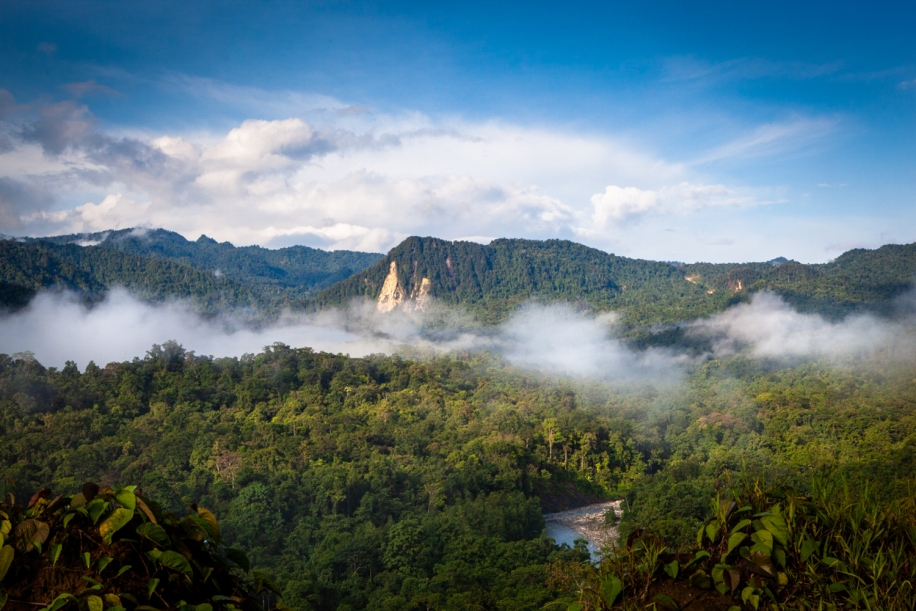

The view from the only road for hundreds of miles. Just a few years ago, the only way to get here was on foot. Now a Malaysian logging company has built a “free” road on private land to access high-value timber in the area. Local clans who have struck deals with the company are paid the value of the timber, as estimated by the company, once the cost of removing the trees is estimated and deducted by the company. In most areas, after the primary rainforest is logged, mining and plantation operations come in. With rampant corruption and little ability to enforce forestry laws, Papua’s rainforest is being changed forever. “White Stone” (the white triangle in the hillside) is the highest homestead encampment in the area and the end of the road.
Forsaking the Next - The fight for our future in the forests of Papua
Sarah Fretwell | Papua New Guinea / West Papua
Photographer: Sarah Fretwell
Exhibit Title: Forsaking the Next - The fight for our future in the forests of Papua
Location: Papua New Guinea / West Papua
On the island of New Guinea, tribes are losing their homes in a land grab for ancient forests. One of the most significant swaths of rain forests on earth, it is also an important carbon sink for the planet.
In these wild west economies, governments, corrupt locals, and corporations are profiting at the expense of tribes, the environment, and the planet's health.
Communities are caught between the promise of a better future or leaving the forests alive. With a need to improve their quality of life, families and communities are deeply divided over the best path forward.
Once the primary rainforest is logged, the trees are lost forever. Then the land is compromised further industrial operations. Some locals become indentured servants on their own land, industry pollutes the water supply and leaves the land barren.
In the midst of a massive reorganizing of traditional society, business as usual in New Guinea is also a perilous experiment for the planet.
With immense respect for their ancestors and land, Papuans also hold reverence for "the next," the following generations who will inherit the successes and failures of globalization.
As I approached her family land, Ruth held up her hand to stop me. She needed to ask the spirits' permission before I set foot on the land. After she announced my arrival in her native tongue, I asked her to translate, "You come in peace as a friend from this far away land, you also have your own tribe, your own spirits, your own ancestors, but you come in peace, so I welcome you here, Sarah and nothing will befall you while you are here on this land."
These ancient lands and communities are under immense pressure as indigenous people are forced to choose between the promise of a "better future" (development) or economic instability (leaving the forests and resources intact). Ruth told me, "here, we do not inherit bank accounts. We inherit the land". Land that many of their grandfathers and great-grandfathers fought for is the only inheritance for the next generation, and it is being sold out from under "the next" for short-term gain,
The Papua New Guinea government is brokering ninety-nine-year leases with corporations (primarily foreign). Large swaths are being sold out from under tribes as cheap timber, and the land is cleared for industrial agriculture such as palm oil.
On the other side of the border in West Papua (now under the forced control of Indonesia), large Palm Oil plantations and mining operations are already actively polluting wells and the ocean. Melanesians have lost fundamental human rights, and many tribes have been pushed from their land. Everyone lives in fear of the brutality of the Indonesian government and spies.
The parallels between these two countries on the same island are striking. They "share" cultural decimation, destruction of entire ecosystems, natural resource extraction, violence, and the oppression of minority communities. In some instances, conservation-based development allows the landscape to stay. At the same time, locals are profiting from things like small-scale beekeeping and cacao, utilizing their existing skills and preserving their way of life. In other cases, they are being silently wiped out.
I believe there has to be a better way where people and the planet can thrive alongside the business. Sharing the valuable lessons of these forests and the wisdom of these people can help ensure a sustainable future for all.
Helping shift the bottom line and global warming starts with you. Calculate your carbon footprint in 2 clicks - ecosphere.plus/carbon-footprint-calculator/
Educate yourself about palm oil - thebreakthrough.org/index.php/programs/conservation-and-development/can-palm-oil-deforestation-be-stopped
Learn the simple science of Global Warming and learn how your decisions as an individual and consumer are a key to the solution - globalwarmingprimer.com/primer/
Blue Earth Alliance
www.sarahfretwell.com
sarah@sarahfretwell.com
Make Comment/View Comments